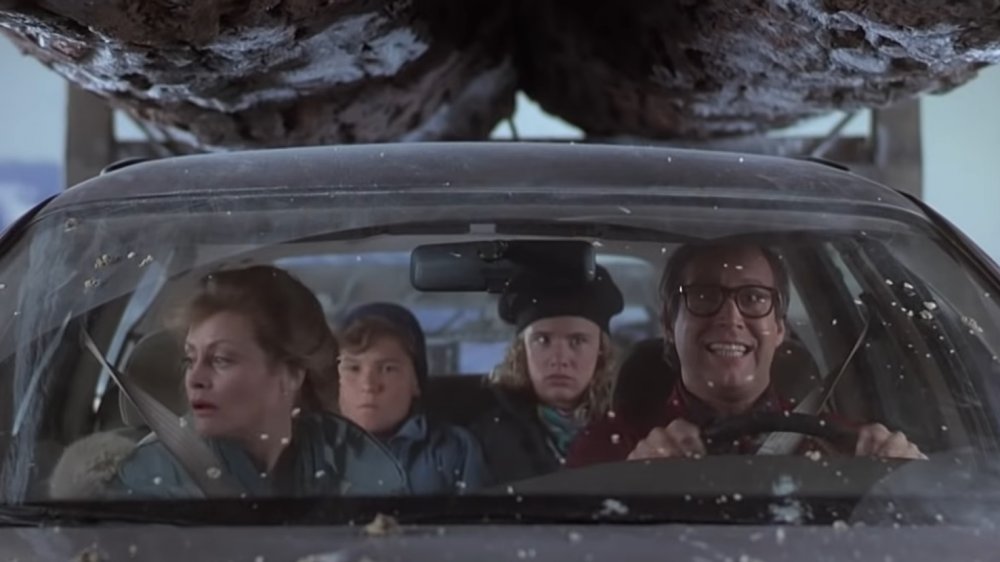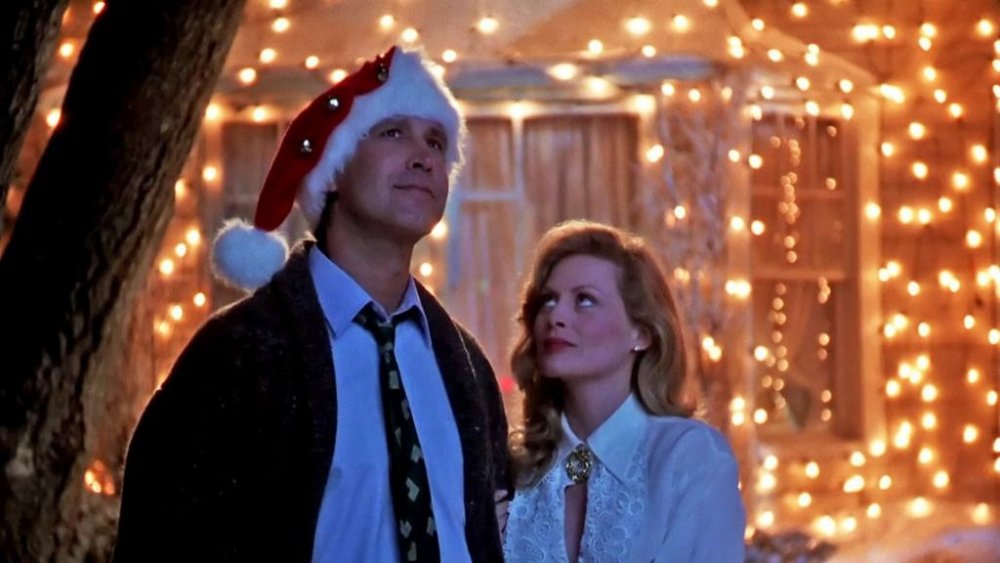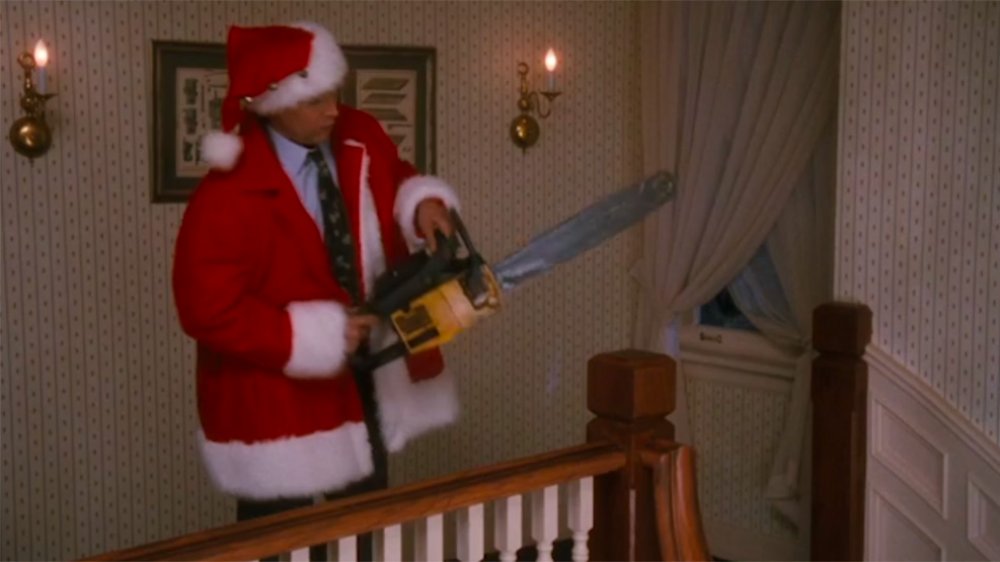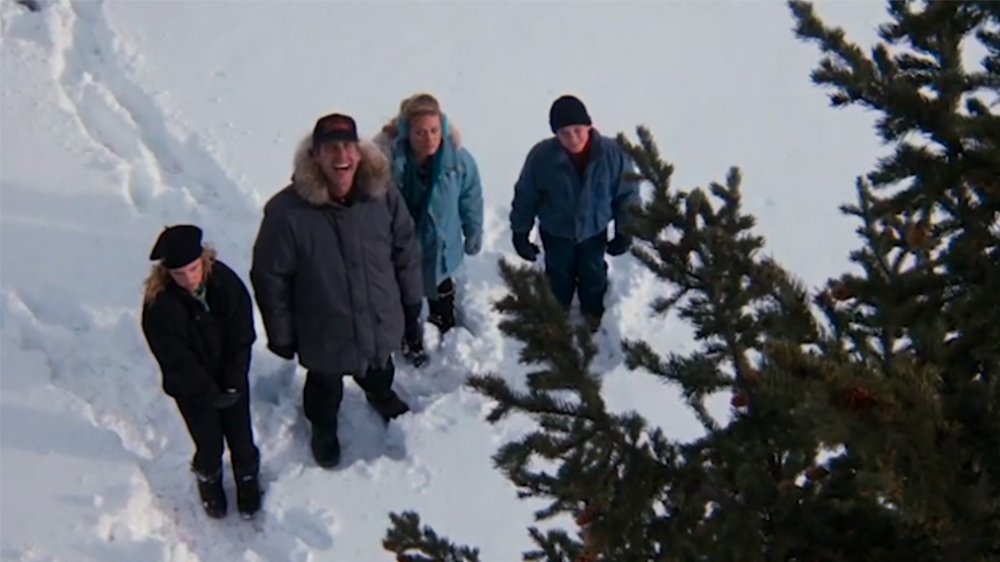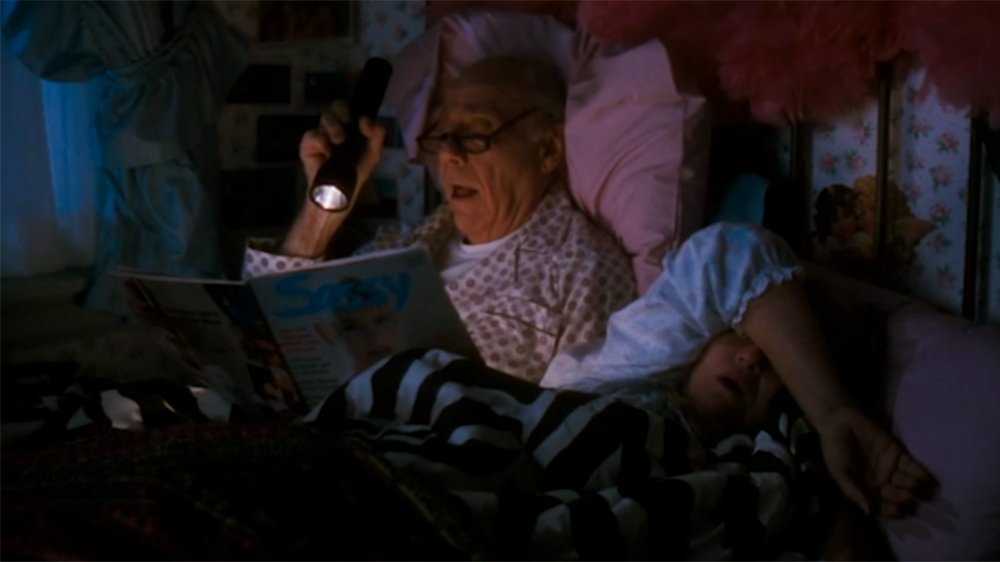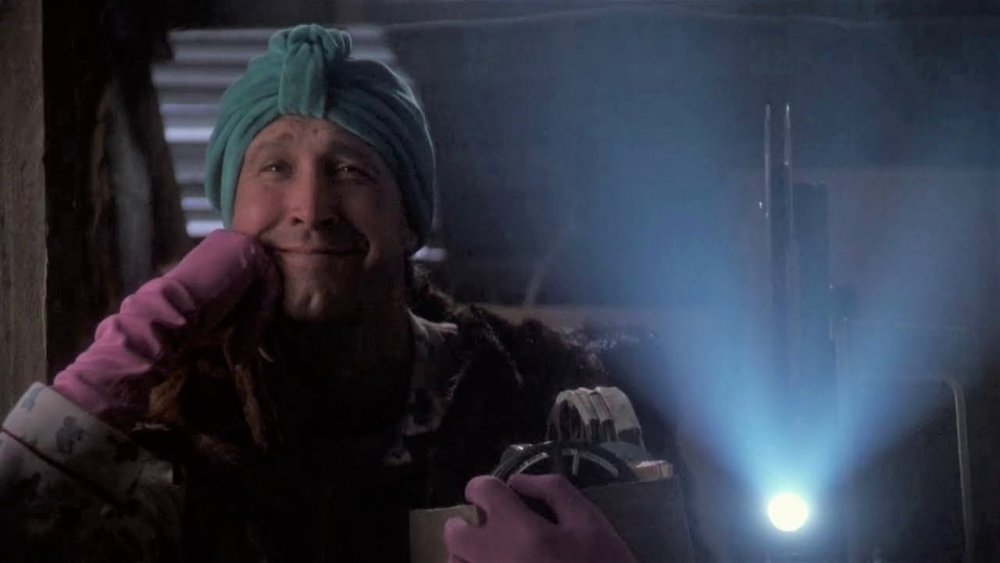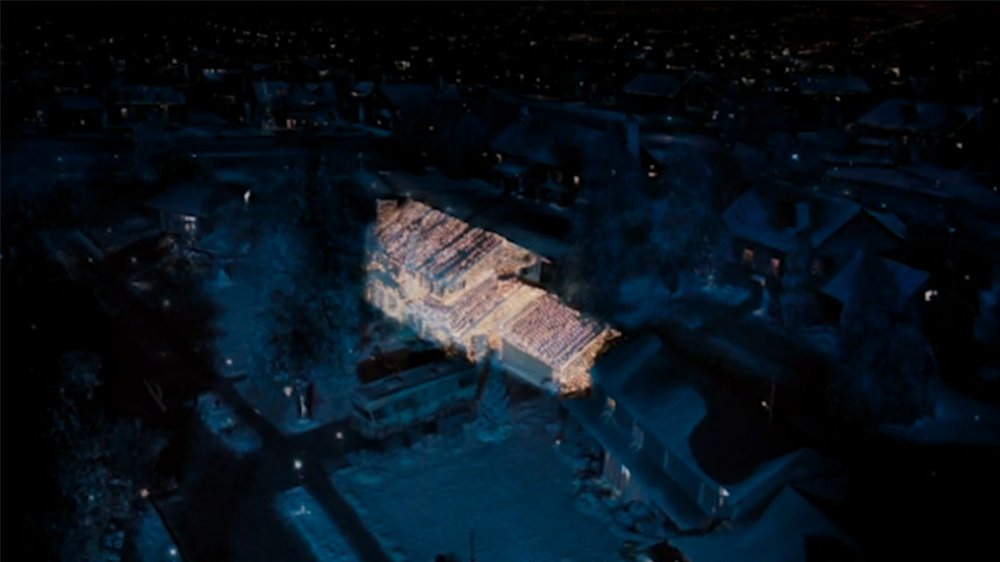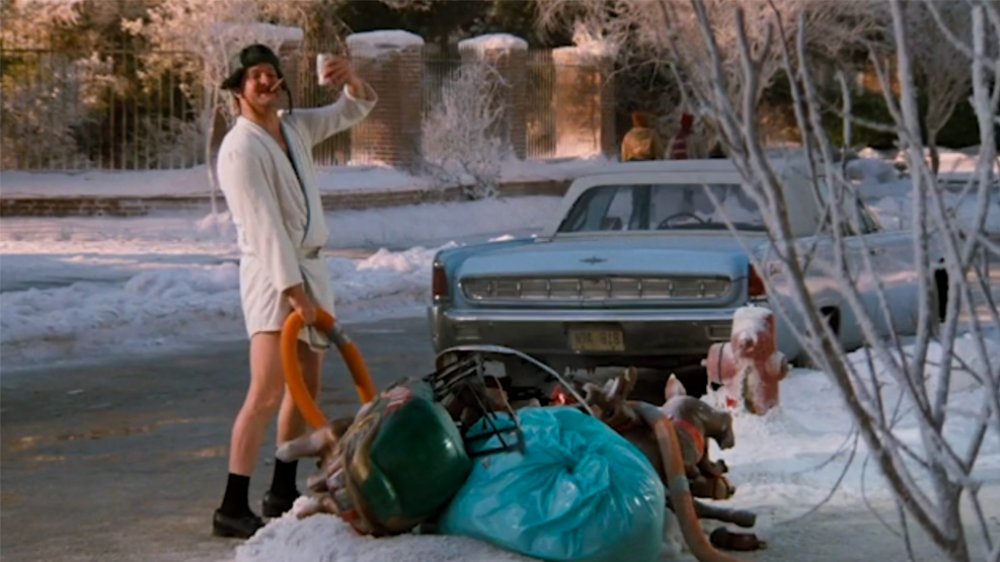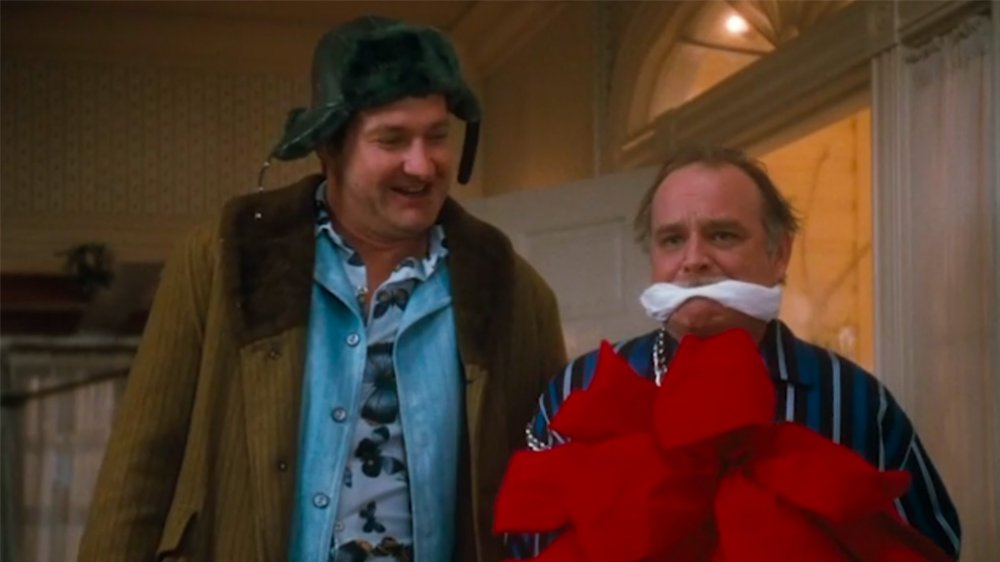Dumb Things We Ignored In National Lampoon's Christmas Vacation
National Lampoon's Christmas Vacation is one of the all-time classic holiday comedies. Like A Christmas Story, it captures all the frustrations of dealing with your family on Christmas, but rather than focusing on the disappointment of trying to strike a deal with Santa and finding out that the gift you begged for wasn't actually that good, Vacation deals with the adult side of the story, where you're sweating over money problems, dealing with a family that gets on your very last nerve, and trying to hold everything together until the 26th, when you can finally stop being so jolly.
But while it's definitely earned its spot in the holiday canon, and while a lot of these gags are still fresh 30 years later, it's not perfect. Even by the standards of a screwball comedy, there's some stuff in here that just flat-out doesn't make sense. From the dubious decisions that reveal Clark Griswold as the true villain of the movie to the reasons why it's actually kind of a horror flick, here are the dumb things we've all been ignoring about Christmas Vacation.
Clark Griswold is a really bad dad
Clark Griswold is a terrible person. Of course, that shouldn't come as a surprise. It's kind of the point of the entire movie, and it's one of the reasons we can all have a good time laughing at the endless series of indignities and injuries that are heaped upon him over the course of the film. That said, a movie like this will usually give its main character some kind of redeeming quality or a moment where they change their ways so the audience can rally around them and root for a happy ending. But Clark never changes. Clark sucks, and he does so from the first scene of the movie to the last.
That's not an exaggeration, either. The opening scene of the movie gives us a pretty good look at exactly the kind of terrible person Clark is, and it specifically illustrates one of his worst qualities: He's a genuinely terrible father. The very first thing we see him do in the movie is fly into a rage and try to get into a Dom Toretto-style street race against a couple rednecks, which nearly results in the family car getting crushed under the wheels of a speeding semi truck. If Clark's alone while he's doing this, fine, whatever, but all of this is happening while his wife and children are begging him to stop, owing to the very real possibility that they could die. He's willing to put his children in mortal peril for no reason.
And it just goes on from there. He ignores Audrey freezing to the point of looking like Jack at the end of The Shining while he drags his kids into the wilderness to get a tree, subjects them to a family gathering that both he and his wife know are going to make their kids miserable, and perhaps worst of all, he never gets them a Christmas present. The one big surprise he has coming, the pool he's adding to the family's back yard, is really just for him.
Clark is a horrible husband
Clark might be a terrible parent, but his performance as a dad seems like he's in the running for Father of the Century when you stack it up next to how he fares as a husband. Let's start with the easy stuff — you know, the basic, bare minimum relationship maintenance that you'd expect from your partner. Like, say, letting them know that you're planning on spending thousands of dollars on a pool. That's a low bar to clear, but Clark crashes right into it with the kind of oblivious recklessness that you'd expect from a runaway bus, all in the name of keeping his self-serving "present" a surprise from his family.
Even worse? The Griswolds don't actually have the money to spend. The biggest plot point of the entire film is that Clark is waiting on his Christmas bonus to show up in order to cover the cost of his non-refundable deposit, and at one point, he makes a wry comment — in a conversation with a child, weirdly enough — about how he "can't even afford to be an elf." This is a family in a very precarious financial position, but Clark, a Reddit Relationships post waiting to happen, blows whatever meager savings they have on a "surprise" that only he wants. The only thing keeping the Griswolds from total financial ruin is a literal federal crime committed in the third act.
Okay, so maybe financial decisions aren't Clark's strong point. Let's give him an incredibly simple challenge, something that even a terrible husband would have an easy time with, like just not getting so thirsty for a shopgirl that you tell her your wife is dead, then correct yourself by telling her you're divorced, and then letting it (Freudian) slip out that you want to commit adultery. This is, in many respects, the basic function of being married — literally just being married. You might be willing to write this off as harmless flirting, but consider that later on, Clark gets caught up in having an elaborate fantasy about pool ownership in which he replaces his entire family — including Ellen and the kids — with the woman from the lingerie counter. Clark might love his wife and kids, but he sure as heck doesn't seem to like them.
The Christmas Chainsaw Massacre
By the end of the movie, the stress of trying to hold his family's fun, old-fashioned Christmas together gets so intense that Clark fully snaps to an extreme that even the most dysfunctional family would probably find alarming. After ranting and raving about his boss cheaping out on the Christmas bonus — a furious monologue with dire consequences to come later — Clark forbids his family from leaving when they try, then puts on a Santa suit and starts wandering around the house with a chainsaw, literally destroying pieces of his home in some kind of fugue state.
By the time that happens, Christmas Vacation has morphed into The Texas Chainsaw Massacre. It's a full-on horror movie, but the weird thing is, nobody really reacts like that's the case. After being literally held hostage by a chainsaw-wielding madman, the extended Griswold family just heads back to the living room to chill out with some eggnog, presumably awaiting a grisly decapitation because at this point, that's the best thing they can hope for out of their holiday gathering. Really, though, that's just par for the course for comedy. Everyone reacting as though something out of the ordinary was happening would ruin the joke. But then things get even weirder when the Griswold family actually does start to lose their collective sugar, freaking out and scrambling around the house in a panic because of ... a squirrel.
Look, an unexpected indoor squirrel is certainly a surprise, but it's not really a cause for concern. According to the CDC, squirrels, despite having the reputation of a wild rodent, "are almost never found to be infected with rabies and haven't been known to transmit rabies to humans." Even if this thing was foaming at the mouth with human blood dripping from its tiny, squirrelly teeth, however, it would still be way further down the list of things to be worried about if you compared it to "unstable financially devastated chainsaw-wielding rage maniac with nothing to lose."
Does Clark have superhuman strength in National Lampoon's Christmas Vacation?
The Griswold family should really be worried about Clark's rage issues. Why? Well, apparently he has super strength.
That's the only explanation for one of the weirder gags that we get in the movie's opening scenes. After tromping through the snow for hours and nearly turning his daughter into a corpse that wouldn't be found until the spring thaw, Clark finally leads his family to the "perfect" Christmas tree. Unfortunately, thoughtless idiot that he is, Clark has forgotten to bring a saw, a hatchet, or anything else with which he could cut it down. The obvious end to this gag is that everyone has to take this arduous journey into the depths of the forest surrounding Arendelle for a second time, but that's not what happens. Instead, in what's actually a pretty good subversion of expectations, the movie cuts to the tree tied to the roof of the Griswolds' station wagon, having been completely uprooted.
But that leads us to the question of just how this happened. We can assume that Audrey was too frostbitten to help much, and considering that Rusty's played by Johnny Galecki, who'd go on to star in The Big Bang Theory, we can assume that tree-toppling strength isn't his defining characteristic either. That leaves us with Ellen and Clark as the only two suspects, and considering that he's the one with a rage problem who has a day job working on experimental chemicals, we think it's safe to assume that Clark's the one who's more likely to turn into the Incredible Hulk. How else do you explain how a 46-year-old middle manager who uproots a comically oversized fir tree with his bare hands?
Christmas Vacation's strange (and stupid) bedfellows
Most of us have been in the position of having to deal with a house full of relatives over the holidays, and we all know that it can be incredibly stressful. Like the old saying goes, houseguests are like fish. After a couple of days, they really start to stink. With that in mind, you'd think the Griswolds would want to spare themselves as much of a headache as they could. Instead, they seem to have gone out of their way to make it an even bigger hassle.
As soon as Clark's and Ellen's parents arrive, Audrey complains about the fact that she's going to have to share a bed with her brother, which is a legitimate complaint but a pretty understandable situation. Until, that is, you see the actual sleeping arrangements. Ellen's parents wind up in Audrey's bed (with a sight gag about Ellen's elderly father reading an issue of Sassy by flashlight), but Clark's parents are sleeping in bunk beds, in what, judging by the decor, is presumably Rusty's room. You see the problem here, right?
Why not let the married couple take the bed that Audrey and Rusty have to share — since one assumes they're used to sleeping together after half a century of marriage — and give the kids the bunk beds? Sure, they're not ideal, but they're definitely, you know, two beds, which would cut down on at least one person's grumpiness. Then again, maybe you can pin this one on Ellen. When Audrey complains, she tells her, "It's Christmas, and we're all in misery." Maybe she's just enforcing that philosophy as much as she can.
Trapped in the attic
About 30 minutes into the movie, there's a gag where Clark heads up to the attic to hide a preset for Ellen, and he winds up getting trapped up there while the rest of the family goes on a shopping trip when his mother-in-law shuts the trapdoor behind him.
So here's the problem. Attic doors don't work like that. If you grew up with one in the house, then you already know this, but they're mainly held closed by springs and friction so that you can just easily pull them down using the chain on the bottom side. There's no latch or lock to keep it in place, and even if there was, we would've seen it in the shot where Clark opens the trapdoor the first time, and we don't. There's no reason for Clark to be trapped up there at all.
Does this matter? Absolutely not. It's the very definition of a nitpick, a dumb thing we all ignore that we're probably better off not thinking about at all. In fact, it's very easy to just overlook it and get on with the movie, and we'd absolutely be willing to do so, if there was any point to Clark getting stuck in the attic. It's actually one of the movie's weakest scenes, and even worse, it comes after two really solid gags: Clark getting bopped in the face when the ladder slides down, and then his discovery of a dust-covered Mother's Day present from 1983 — six years before this movie came out — in his preferred present-hiding spot. The whole thing with the ladder door getting stuck just leads to a pretty boring sequence that drags the comedy to a halt, and it does nothing more than give the audience some time to go fill up their eggnog.
The great Chicago blackout of 1989
As a testament to how far over the top he's going in an effort to have a merry Christmas, Clark Griswold covers his home in "250 strands of lights, 100 individual bulbs per strand, for a grand total of 25,000 imported Italian twinkle lights." This is, by any measure, a lot of lights.
It's so many, in fact, that when the circumstances finally align to the point where they turn on, it causes a drain on the power grid that only ends when an auxiliary nuclear reactor is switched on. That's a lot of juice no matter what standard you're measuring by, but consider that this movie takes place in Chicago, which is the third-largest metropolitan area in the country. For the brief time that the lights are on, Clark Griswold is using the electrical equivalent of 9.4 million people.
Considering the family's shaky finances, it's doubtful that they could absorb the cost of that much power usage, which will undoubtedly leave the Griswolds devastated when the bill arrives in January. Beyond that, though, the real cost — the human cost — might be even higher. How many casualties are there in the moments that Chicagoland is drained of electricity, or when Clark overloads the nuclear plant? It's impossible to say, but it might be fun to watch HBO's incredibly disturbing Chernobyl and think of it as a sequel to Christmas Vacation. If nothing else, it's a jollier time than actually watching Christmas Vacation 2.
Clark's criminal negligence
One of Christmas Vacation's most memorable (and quotable) scenes is the one where a thoroughly defeated Clark watches Cousin Eddie empty his RV's septic tank into the gutter outside the Griswold house. The money here is Eddie's cheerful wave and announcement that his, uh, bathroom's full, but while he watches, Clark casually points out that it's a storm drain, which makes it both illegal and dangerous. "If it fills with gas, I pity the person who lights a match within ten yards of it."
On the surface, this is just a great example of the classic literary trope of Chekhov's Sewer Explosion, but if you think about it for a second, things are a little more sinister here. For one thing, Clark never mentions this to any of the other family members, even though several of them — including his wife — are smokers who might duck out for a quick cigarette and be blown off the face of the Earth. What's more telling, though, is that Cousin Eddie is actually smoking a cigar while this is happening, and Clark says nothing, just watching dispassionately while the man whose death he's expressed longing for endangers himself, his home, and the rest of Clark's family. The resulting explosion at the climax of the film is definitely the result of Clark's negligence, but it's actually a little more accurate to look at it as an attempted murder. And yet, despite the fact that the police are there when this happens, no arrests are made.
Christmas Vacation's ending is incredibly dumb
It's fun to pick apart the holes in a beloved Christmas classic, and since they're a little off-kilter by their very nature, slapstick comedies are always easy targets. Really, though, part of the price of admission is agreeing that while all this goofy stuff might not be realistic, it's worth it to get some laughs. Sometimes, though, a movie goes so far out of the realm of possibility that it just becomes incomprehensible, and National Lampoon's Christmas Vacation is one of those movies.
In case you've forgotten, all of the various problems faced by the Griswolds over the course of the film wrap themselves up into a nice neat bow when Cousin Eddie literally kidnaps Clark's boss, ties him up, gags him, and drags him across town to the Griswold house, creating the movie's second (and most serious) legitimate hostage crisis. For once, the people around these events react realistically, and the police arrive, only to find that Clark's boss doesn't want to press charges, and instead is rewarding his employee with a gigantic Christmas bonus.
Look, none of us want this movie to end with Clark being hauled off to prison — well, some of us do, but we realize that's not really the point — but this stretches our suspension of disbelief to the breaking point. A corporate CEO deciding to give an employee more money than he's required to by law is hard enough to believe, but doing it in response to a straight-up federal crime? That's too far, even for a Christmas miracle.

